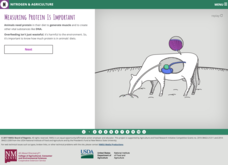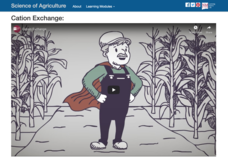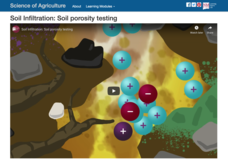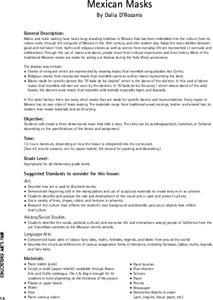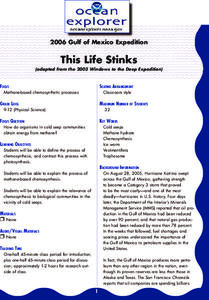Mexico Teacher Resources
Find Mexico lesson plans and worksheets
Showing 3,111 resources
Learning Games Lab
Controlling Water Activity in Food
Food storage matters! Scholars learn how the amount of water in corn can affect its rate of spoilage. They create a control group, then test three corn samples stored in three different locations for water activity. As a result of the...
Learning Games Lab
How to Use Oil Immersion Microscope
Teach the class how to use a microscope to identify bacteria in food. Scholars explore the different parts of the microscope and learn how to determine total magnification. They walk step-by-step through the procedure of preparing slides...
Learning Games Lab
The pH Scale and Meter Calibration
What are the different ways to test for pH? First, scholars explore the pH scale and a common way to test for acidity and alkalinity. Then, they learn about the importance of pH in food safety and why variance in pH could potentially...
Learning Games Lab
Nitrogen in Feed
Knowing what farmers are feeding livestock is just smart business. A WebQuest lesson helps learners build an understanding of the relationship between amino acids, nitrogen, and protein. With interactive instruction,...
Learning Games Lab
Nitrogen in Fertilizer
Nitrogen is an essential element for productive farming. An interactive lesson explores the chemical makeup of different fertilizers and their corresponding nitrogen content. The interactive challenges individuals to complete...
Learning Games Lab
Nitrogen in Pollutants
Responsible farming is important for maintaining natural resources. Eager scientists complete a WebQuest to explore what happens to nitrogen when it enters the soil. They learn about the chemical makeup of nitrogen-based molecules...
Learning Games Lab
Everything is Chemical
Chemistry is the foundation of good farming. Learners explore how chemical bonding applies to agriculture. The lesson highlights the difference between organic and inorganic compounds and how similar compounds bond in very different ways.
Learning Games Lab
Cation Exchange
Understanding soil composition requires an understanding of chemical bonding. An informative video lesson shows learners how the atoms and molecules in the soil form ions that attract and repel other atoms and molecules. The...
Learning Games Lab
Soil Infiltration: Soil Porosity Testing
Soil pollution has a longer reach than may seem possible. A video presentation demonstrates how a seemingly isolated soil contamination spreads and even reaches waterways. The lesson demonstrates how scientists conduct porosity tests...
Learning Games Lab
Testing and Adjusting pH
Pupils learn how to control food spoilage by adjusting the food's pH. They see that one of the most dangerous bacteria can grow in food if people don't handle and store food properly. Using knowledge of the bacteria's preferred pH,...
Learning Games Lab
Scientific Graph Reading
Interpreting graphs is an essential skill for young scientists. An interactive online lesson gives individuals an opportunity to review the components of a graph and learn to read and interpret the shape of a graph. The lesson includes...
Learning Games Lab
The Magic of Reading Graphs
Making conclusions from graphs doesn't need to seem like magic. Learners explore an interactive lesson on reading graphs to strengthen their skills. The content discusses how to read the axes of a graph and draw conclusions based on the...
Learning Games Lab
Logarithm Calculator
Support your young scientists' knowledge of logarithms with a quick video lesson. The instruction first presents the relationship between a base-10 logarithm and an exponential equation. It then demonstrates how to use a calculator to...
Stanford University
Migrant Mother Photograph
A picture often has hidden stories to tell. Looking at the iconic Migrant Mother photography by Dorothy Lange, individuals examine the human toll of the Dust Bowl and the Great Depression at large. Other documents, including a statement...
American Museum of Natural History
Layer of Time
Dig through the layers for a better understanding of fossils. Scholars learn that fossils form in layers of sedimentary rock. Pupils arrange virtual layers to show the fossil record of different species. Once the layers are correct, they...
American Museum of Natural History
Tornadoes Spinning Thunderstorms
Tornado winds can reach more than 200 miles per hour. Learners explore wind speeds and more characteristics of tornadoes with an online lesson. They learn how tornadoes form and how scientists attempt to predict them. Can be used as an...
American Museum of Natural History
The Amazing Mundo
Rocks and minerals are great on their own, but they also turn into some pretty amazing stuff! An online lesson explains the different types of materials we get from rocks and minerals, including glass, plastic, and coins. An embedded...
Curated OER
Mexican Masks
Learners explore the Mexican mask-making tradition and create maks that tell stories. They desribe how art tells stories and examine early Mexican culture in California.
Curated OER
Who Were the Mayans?
In this Mayans worksheet, students read about the Mayans on a web site given, then complete a set of 10 related comprehension questions.
Curated OER
The Shapes of Art: A Lesson in Aesthetic Awareness
Students become immersed in analyzing the influences on and development of an artistic paradigm; they also move into, through and beyond the literary piece.
Curated OER
Central America Outline Map
In this Central American political map instructional activity, students make note of national boundaries and capitals in this region of the world. National capital city locations are noted with stars.
Curated OER
CSI on the Deep Reef
After some instruction, small groups prepare a written report on chemotrophic organisms. Though not clearly mentioned, this resource would work best if groups have the Internet available to research the vocabulary and different organisms...
Curated OER
This Life Stinks
Chemosynthetic communities of cold seep areas are considered in this lesson. Working in collaborative groups, marine biology or oceanography learners research and prepare a report about oxidation-reduction reactions involved with...
Curated OER
Cinco De Mayo: ELD Reading and Language-Building
A brief passage about the Mexican holiday Cinco de Mayo is accompanied by an array of language activities for ELD: cloze exercise, phrase matching, word jumble, multiple choice, sequencing, interview, group presentation, fluency writing,...
Other popular searches
- Mexico Geography
- Mexican History Mexico
- New Mexico
- Christmas in Mexico
- Christmas Traditions Mexico
- Mexico Culture
- History of Mexico
- New Mexico Geography
- Mexico Immigration
- Mexico City
- Geography of Mexico
- Animals of Mexico





